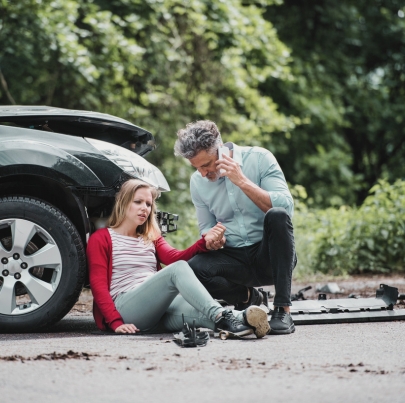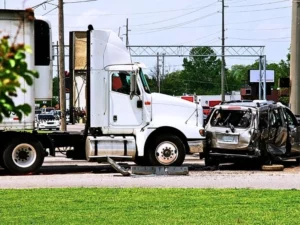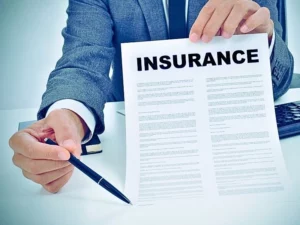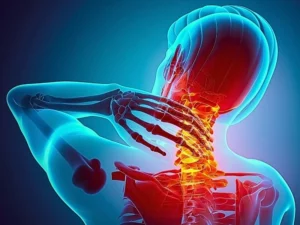As a passenger in a car accident in Chicago, you may be able to recover compensation from liable parties and take legal action if you sustained injuries and other damages. It’s important to understand your rights as a passenger if you’re considering taking action following any type of vehicle accident.
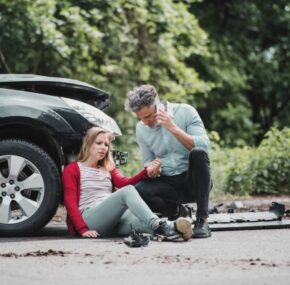
How to Prove Negligence and Liability as an Injured Passenger
Like other types of liability cases, you will need to prove negligence in car accident cases. Determining fault is potentially difficult, especially if there are multiple liable parties involved in an accident.
There are four main facts you must be able to prove in these cases, including:
- The liable party owed a duty of care, such as a driver who needed to obey traffic laws.
- This party breached this duty of care through negligence or malicious intent.
- This breach of duty led to an accident.
- The accident resulted in injuries and other quantifiable damages.
Damages You Can Recover from a Car Accident as a Passenger
There are several types of damages that you may be able to recover from a car accident in a personal injury case. The main categories of damages include economic, non-economic, and punitive damages.
Economic Damages
The first type of damages to consider is economic, also known as special or monetary. These damages include the financial losses sustained because of an accident and resulting injuries.
Types of economic damages in these cases include medical bills, lost income, lost earning capacity, the cost of repairing or replacing damaged property, and modifications made to the home to accommodate a disability. More serious accidents tend to result in more extensive economic damages that warrant larger amounts of compensation.
Non-Economic Damages
To supplement economic damages, some cases may also involve non-economic or general damages. These damages apply to the pain and suffering and other personal losses experienced on the part of the car accident victim.
Some examples of these damages include physical pain, psychological distress, depression and anxiety, trauma, disfigurement, and loss of consortium (relationship), among others. These aren’t as easy to calculate as economic damages because they don’t come with an identifiable monetary loss. However, it’s possible to quantify these damages and include them in a settlement.
Punitive Damages
The majority of car accident cases don’t involve punitive damages, but they could come into play if the liable party acted with egregious behavior that warrants additional punishment. While you can recover economic and non-economic damages when negotiating a settlement with insurance companies, you can only recover punitive damages in a trial setting from a judge or jury.
The goal behind awarding these damages is also different from that of economic and non-economic damages. While the latter two damages aim to compensate victims for their injuries, punitive damages have the purpose of punishing the defendant to deter similar behavior in the future, making an example of the defendant.
What Are the Rights of a Passenger in a Car Accident?
If you are a passenger in a car accident, can you sue? If you sustain injuries and other damages in a car accident, you have rights available to you, including the right to seek compensation and take legal action against liable drivers and others responsible for your damages.
You may seek compensation in a few different ways, depending on the nature of the accident:
- File an insurance claim with your own insurance company
- File a claim against the liable party’s insurance company
- File a lawsuit against the liable party
If you get into a car accident in Chicago and someone else is responsible, you would normally file a claim against the at-fault party’s insurer to recover compensation. However, you might need to file with your own insurance company if the at-fault party is uninsured or underinsured. You could also decide to file a lawsuit against the liable party if you fail to settle during negotiations with insurers.
A car accident attorney with experience handling these cases can help you determine which form of action to take after an accident.
What to Do if You Are a Passenger in a Car Accident
In the event of a car accident, passengers can take several steps to begin handling the accident, recovering from injuries, and increasing their chances of succeeding with a personal injury claim or lawsuit.
The following are some steps to take following an accident:
Seek Immediate Treatment if Needed
If you believe you or another party has suffered serious injuries requiring immediate care, you or someone else should call an ambulance to arrive at the scene. Even if you don’t sustain injuries that are apparently serious or come with troubling symptoms, you should still see a doctor soon after the accident. A medical professional can properly examine and diagnose your injuries, and he or she can also draft medical records that help prove then nature of your injuries in a claim or lawsuit.
File a Police Report
If an accident involves injuries or serious damage, you should call the police to report the accident. One or more police officers can then arrive at the scene of the accident to assess it, creating a police report in the process.
The police report will include all critical details about the accident, including evidence gathered at the scene and witness testimony. You can also relay your account of the accident, but be as clear and detailed as possible in your retelling of events.
A police report could wind up being a crucial piece of evidence supporting your argument in a car accident case.
Collect Information From Others at the Scene
Get the details of the motorists involved in the accident, including their names, phone numbers, license plate numbers, driver’s license numbers, and insurance information.
In addition to other motorists involved, try to get contact details from witnesses who saw the accident. They may be able to make statements that further support your version of events.
Record as Much Evidence as Possible
If you can, take photos of the accident and any injuries and property damage you sustained. Items at the scene to photograph or video record could include any damaged vehicles or other surrounding property, damaged personal belongings, visible injuries, traffic lights and signage, and any skid marks or other physical evidence indicating how the crash occurred.
Speak With a Lawyer
The next step to take after seeking treatment and gathering evidence is to ask a car accident lawyer about your options when it comes to seeking compensation. A lawyer can review the details of your case and determine whether it’s possible to succeed with a claim or lawsuit.
How a Car Accident Attorney Can Help You
Having a car accident lawyer by your side can benefit you in multiple ways if you decide to file a claim or lawsuit. While you might believe you can handle a car accident case on your own, especially when injuries and damages are minor, having an attorney could help you succeed and navigate your case with efficiency.
When filing a claim against a liable party’s insurer, for example, insurers and their adjusters may seem eager to help you get the compensation you deserve. However, they are always looking for valid reasons to reject or minimize claims to avoid large payouts. An experienced car accident attorney will know the tactics that insurers often try to use, including making initial lowball offers and even acting in bad faith.
Attorneys can also represent you in court if your case goes to trial in a lawsuit. Representing yourself in these cases could compromise your case, as you may not have the trial experience needed to make a strong argument or present all necessary evidence to support your argument. An attorney knows how this process works and can take the necessary steps to increase your chances of success.
Additionally, a lawyer will be able to help you calculate the full amount of compensation your case is worth. He or she will look at all available evidence and the damages you sustained to calculate the total settlement amount and fight to recover it.
Know Your Rights as a Passenger in a Car Accident
As a passenger, you have the option of recovering compensation from at-fault drivers and other parties in car accidents. Whether you choose to seek compensation through a claim with your own insurer or the other party’s insurer or a lawsuit against the at-fault party, you could build a successful case that awards you total compensation. A lawyer with experience handling these types of cases could work with you to determine how much your case is worth and begin seeking full compensation on your behalf in a personal injury case.

